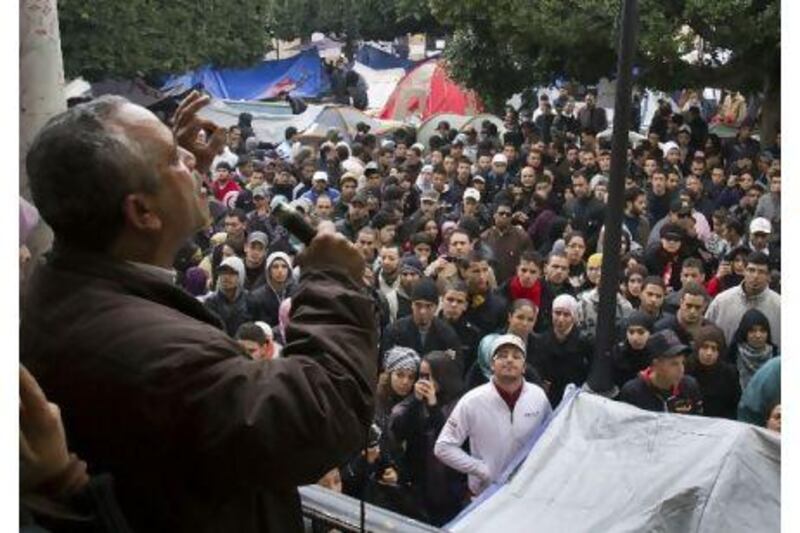TUNIS // Deadly rioting and the resignation of the prime minister have rattled Tunisia, complicating democratic transition in a country whose revolution in January has inspired similar uprisings around the Arab world.
On Sunday, Tunisia's interim president, Fouad Embazza, named Baji Caid Essebsi to head the country's caretaker government after the prime minister, Mohamed Ghannouchi, stepped down following a fresh wave of protests and unrest.
Yesterday, the industry and technology minister, Mohamed Afif Chelbi, also resigned, in another apparent sign of fragility at the top of Tunisian politics.
Mr Essebsi, a former foreign minister under Tunisia's first president, is charged with steering the country toward elections expected in July, which Tunisians hope will inaugurate a democratic era following decades of dictatorship.
Six weeks ago, protests over unemployment and corruption spiralled into calls for the departure of Tunisia's strongman president, Zine El Abidine Ben Ali, who fled the country last month after 23 years in power.
The spectacle of Tunisian demonstrators winning change has emboldened protesters in other Arab countries. Anti-government demonstrations have helped topple the Egyptian president, Hosni Mubarak, and evolved into an ongoing revolt against the Libyan leader, Muammar Qaddafi.
Back in Tunisia, however, an interim coalition government has grappled with political chaos as protesters, civil society groups and media have demanded that Mr Ben Ali's former political allies be purged from public life.
Since Mr Ben Ali's ouster, Tunisia's interim cabinet has been reshuffled to eject members of his party, the Democratic Constitutional Rally (RCD), while the party's activities have been suspended.
Nevertheless, anti-government activists marched in the streets and held sit-ins outside the prime minister's office to demand further concessions. In particular, they piled pressure on Mr Ghannouchi, a holdover from Mr Ben Ali's government.
On Saturday, that pressure was compounded when an apparently separate group of rioters swarmed into central Tunis' main promenade, Avenue Habib Bourguiba, throwing stones as police fired tear-gas. Three people were killed and more than 100 were injured.
Such unrest poses an especially difficult challenge to political leaders because Saturday's rioters have so far not voiced clear demands, said Seloua Cherfi, a professor of political science and journalism at the University of Tunis.
On Sunday, Mr Ghannouchi announced his resignation in a televised address, saying that he was "not willing to be a person that takes decisions that could cause casualties." His departure may help calm some tempers in Tunisia, where street politics has become the order of the day since protesters drove Mr Ben Ali from power.
"Symbolism counts for a lot in Tunisia," said Mrs Cherfi. Mr Ghannouchi "may be seen to have clean hands personally, but he served in [Mr Ben Ali's] regime for years." Mr Essebsi, by contrast, served as a foreign minister under Mr Ben Ali's predecessor, Habib Bourguiba, but was not part of Mr Ben Ali's government.
That is not enough to satisfy activists like Ramy Sghayer, who has helped organise the current sit-in outside the prime minister's office on a hill above Tunis' old city.
"We consider Ghannouchi's resignation a good first step," said Mr Sghayer, standing on a balustrade as hundreds of protesters milled about the square below. "But we don't want to change only the prime minister."
Mr Sghayer and other activists are calling for the entire cabinet and parliament to be replaced with a council formed to draw up a new constitution, he said. Before his departure, Mr Ghannouchi had also promised a new constitution.
"This is a revolution," said Mr Sghayer. "We must change everything - radically."
While the sit-in was unfolding in a festive air yesterday, a fretful calm prevailed in Avenue Habib Bourguiba. At one end of the avenue, soldiers and armoured cars were stationed outside the interior ministry, where they have stood since January encircled by snarls of barbed wire.
Further along the avenue, new security measures were in place: plainclothes police were conducting random identity checks. For reasons that were unclear, they detained several young men from among the crowds strolling under the ficus trees.
The weekend's developments "don't make for a very positive image," Mrs Cherfi said. "But such things were expected. We're in a transition period, and that means a degree of instability."
[ jthorne@thenational.ae ]





